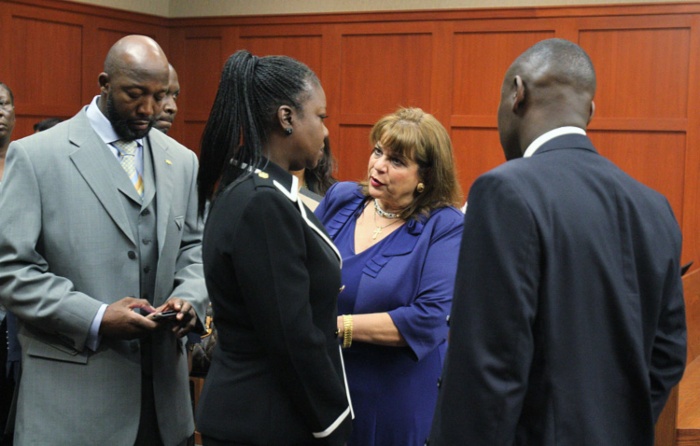-
Why Do People Choose Bail Bonds Overpaying Bail in Full?
Why Do People Choose Bail Bonds Overpaying Bail in Full?
Do you or a loved one need bail? The goal is simple: get out of jail and get back to life. But should you pay bail in full or go with a bail bond? Because of the financial and practical implications, you should understand these choices thoroughly before deciding. Here’s why people often turn to bail bonds rather than paying bail in full.

How Do Bail Bonds Work?
A bail bond or surety bond is an agreement that allows a defendant to be released from jail while awaiting trial without paying the full bail amount. Imagine bail is set at $8,000—too steep for many people to pay in cash. This is where a bail bond comes in. You work with a bail bondsman, who covers most of the bail on your behalf in exchange for a fee, typically 10% to 15% of the bail amount. So, in this example, you would pay $800 to $1,200 instead of the full $8,000.
The bail bondsman then becomes responsible for ensuring you appear in court. If you follow through, the bail amount will be refunded to the bondsman, and your case will proceed as scheduled. However, if you don’t, both you and the bondsman will face legal consequences. In short, a bail bond eases the financial burden while still holding you accountable.Types of Bail
There are three primary types of bail designed for different situations:
- Cash bail: If you have the financial means, you can pay the entire bail amount upfront in cash. If you attend all required court dates, you’ll get your money back at the end of the legal process.
- Bail bond: This is the most common way defendants post bail. It enables you to get out of jail without emptying your bank account while still remaining accountable.
- Property bond: If you lack cash but own property, a property bond may be an option. Here, you pledge real estate or other valuable assets as collateral. However, if you don’t show up to court, the property you used as collateral may be forfeited.
How to Apply for a Bail Bond in North Carolina
Follow these steps to apply for a bail bond in Concord, Salisbury, Gastonia, or the surrounding areas:
- Contact a reputable bail bondsman: 1st Choice Bonding & Surety is available 24/7 and responds in 5 minutes or less to help you post bond without delay.
- Provide necessary information: Be prepared to provide the defendant’s full name, the charges, the bail amount, and the location of the jail.
- Sign the agreement: The contract outlines the terms and conditions of the bond, including the defendant’s responsibility to attend all court dates.
- Pay the fee: Pay just a fraction of the total bill to the bondsman, who will cover the rest on your behalf.
- Await release: Once the paperwork is complete and the bondsman posts bail, the defendant is typically released within hours. Preparing a legal defense from home is much easier and less stressful than doing so behind bars.
Pros of Bail Bonds
Bail bonds come with several benefits, making them a practical choice for many:
- Affordability: Sometimes, bail is set prohibitively high, which makes paying the full amount unrealistic. Bail bonds bridge the financial gap so defendants aren’t stuck in jail solely due to the inability to pay.
- Speed and efficiency: Bail bondsmen work quickly because they know time is of the essence. Those with 24/7 availability ensure that even late-night arrests don’t have to mean extended jail time.
- Legal guidance: If it’s your first encounter with the criminal justice system, you may be unfamiliar with the bail process. Your bondsman can explain each step so you know what to expect.
Cons of Bail Bonds
Despite the benefits, bail bonds have some potential downsides to keep in mind:
- Non-refundable fees: The fee paid to the bail bondsman is the cost of the service, so unlike cash bail, it won’t be refunded.
- Collateral requirements: In cases involving a high bail amount or specific risks, you may need to put up collateral, which adds risk to the agreement.
- Conditional release: Accepting a bail bond means you agree to attend every court appearance. Skipping a court date could lead to your re-arrest or losing collateral.
Bail Bonds Are the Fastest Path to Freedom
When legal challenges arise, you need a trusted team by your side. With over 20 years of experience and 6 locations in Concord, Salisbury, and Gastonia, 1st Choice Bonding & Surety is the key to your release. We are committed to getting you back home and back on track by accepting down payments as low as 3% on most bonds. We also believe in second chances, so if you ever miss a court date, we’ll work with you to reschedule. Don’t wait—contact us today to get on the fastest path to freedom.
-
How to Get a Bail Bond in Domestic Violence Cases
How to Get a Bail Bond in Domestic Violence Cases in NC
Facing a domestic violence charge is an incredibly difficult experience, both for the accused and their loved ones. The process can be confusing and intimidating, so if you or someone close to you has been arrested for domestic violence, learn about the bail process to reduce stress and ensure a swift release from jail.

What Is Considered Domestic Violence in North Carolina?
Domestic violence is a criminal act perpetrated against a spouse, current or former romantic partner, family member, or someone living in the same household. Consult a domestic violence lawyer to understand the specific charges against you.
Some prevalent offenses related to domestic violence include:- Assault: Physical attacks causing harm or fear of harm
- Battery: Unlawful physical contact or use of force
- Stalking: Repeatedly following or harassing someone, causing fear
- Harassment: Unwanted behavior causing emotional distress
- False imprisonment: Restricting someone’s freedom of movement without legal authority
- Kidnapping: Forcibly taking or restraining someone against their will
- Sexual abuse: Any non-consensual sexual act
- Child abuse: Physical, emotional, or sexual abuse directed at a minor
- Elder abuse: Physical, emotional, or financial abuse directed at an elderly person, particularly if the abuser is in a position of trust or care
Legal Rights for Domestic Violence Defendants
As a defendant, you have certain legal rights that protect you throughout the process. Working with a domestic violence attorney is the first step to ensuring these rights are respected.
The most prominent rights of domestic violence defendants include:- The right to be presumed innocent until proven guilty
- The right to an attorney
- The right to a fair and impartial trial
- The right to present evidence in your defense
- The right to be free from unreasonable searches and seizures
The Procedure for Bail Bonds in Domestic Violence Cases
The bail process for domestic violence cases in North Carolina follows several steps:
- Arrest and booking: Following an arrest for domestic violence, the accused is taken to a local jail, where the booking process begins. This includes recording personal details, taking fingerprints, noting the charges, and gathering other pertinent information.
- Initial court appearance: Within 48 hours, the defendant will have an initial appearance before a judge, who will set the bail amount based on the severity of the charges, the defendant’s prior criminal history, and the likelihood of fleeing.
- Posting bail: If the judge sets bail, you can secure your release by paying the full amount or obtaining a bail bond through a licensed bail bondsman. Bail bonds are often preferred, especially when the bail amount is high. Note that in domestic violence cases, defendants are usually put on a 24-hour hold before being permitted to post bail.
- Release: Once the bail is posted, the defendant is released from jail and expected to return on all future court dates. Failure to appear results in further penalties and may require the bondsman to locate the defendant and bring them back into custody.
How to Get a Domestic Violence Bail Bond in North Carolina
Securing a bail bond is usually the best option when faced with a high bail amount. Here’s what the process entails in North Carolina:
- Determine the bail amount: Bail could be set as low as $500 to $1,000 for minor first offenses. Repeat or severe offenses lead to far higher amounts or even denial of bail.
- Contact a bail bondsman: Once bail is set, call a reputable bail bondsman for help. This licensed professional will post bail on your behalf for a fee totaling 10% to 15% of the full amount. For instance, if bail is set at $5,000, expect to pay $500 to $750 to secure a bond.
- Sign the bail agreement: This contract states that the defendant will attend all future court dates or be liable for the full bail amount.
- Release from custody: With the paperwork and payment complete, the bondsman posts bail, and the defendant is released from jail. They are free to return home and begin preparing for court appearances.
Ready to Secure Your Release? We’re Here to Help
Time is of the essence when securing your release or that of a loved one facing a domestic violence charge. 1st Choice Bail Bonding & Surety is the best option for getting you back home and back on track because we accept down payments as low as 3% on most bonds. We have over 20 years of experience and multiple locations across Concord, Salisbury, and Gastonia, NC, to better serve you. Our goal is to build lasting relationships with our clients, so we offer flexible solutions if you need assistance rescheduling a missed court date. Our team is available 24/7, and we respond in 5 minutes or less, so don’t wait another moment—contact us today!
-
What Happens at an Arraignment?
What Happens at an Arraignment in NC?
When you’re charged with a crime, your first court appearance will probably be an arraignment. This can be a confusing and stressful experience, especially if you’re unfamiliar with the process. Learn what a formal arraignment is and how it affects things like bail and release.

What Is a Formal Arraignment?
An arraignment is a court procedure where you are formally charged with a crime and asked to enter a plea of “guilty,” “not guilty,” or “no contest.” It’s among the first steps in the legal process, with the primary goal of ensuring the defendant (the person accused of a crime) fully understands the charges against them.
An arraignment allows the court to review your case quickly and gives you the opportunity to post bail before your trial. A magistrate or judge typically handles the proceedings, reading out the charges and any pertinent details related to the allegations.
The Arraignment Process in Civil Cases
Arraignments in civil cases are rare but do sometimes occur. Civil cases start when the plaintiff (the person or party filing the charge) brings a formal complaint to the court. Once filed, the court notifies the defendant, allowing them to respond and appear before the court. This stage permits both sides to consider settling the dispute out of court or through alternative dispute resolution (ADR) methods like mediation.
Bail and bond are generally not involved in civil cases. Still, the arraignment provides structure and guidance for how the legal proceedings will unfold. It allows both parties to understand the court’s expectations and the potential legal consequences of moving the case forward.
The Arraignment Process in Criminal Cases
While the purpose of an arraignment is the same across the US, each state has slightly different procedures, and North Carolina is no exception. Here’s what to expect:
- Timing: Arraignments happen quickly, often within 48 to 72 hours of an arrest. This rapid scheduling ensures defendants are not held for an unreasonable time without formal charges. For serious offenses, arraignment often happens within 24 hours.
- Charges and allegations: During the arraignment, the judge reads the charges out loud to the defendant and others in attendance. These charges are based on an indictment, a formal statement that lists each alleged crime.
- Entering a plea: At the arraignment, defendants are required to enter a plea. Pleading “not guilty” means the defendant intends to contest the charges. Pleading “guilty” or “no contest” could lead to sentencing or plea negotiations without a trial.
- Appointment of legal counsel: At this stage, defendants who cannot afford an attorney will have one appointed. The right to legal counsel ensures fair representation for all.
- Bail and release conditions: Before deciding on bail, the judge considers multiple factors, such as the severity of the charges, prior criminal history, and the risk of fleeing. In some cases, the judge may deny bail if they believe the defendant poses a significant risk. However, if the judge allows bail, it is posted to secure the defendant’s temporary release. This arrangement is known as an arraignment bail bond and allows the defendant to return home while awaiting trial.
- Release on recognizance: If the judge deems the defendant low-risk, they might allow them to be released on their own recognizance (without needing bail). However, this is uncommon in criminal cases with serious charges.
What Happens After an Arraignment?
The legal process after the arraignment depends on the plea entered and the decisions made regarding bail. Here’s what typically follows:
- Not guilty plea: If the defendant pleads not guilty, the case moves forward to pre-trial preparations. This phase may include discovery (sharing evidence between the defense and prosecution), witness interviews, and pre-trial motions. The defense might also work on gathering evidence, building a case, or negotiating with the prosecution for a plea deal.
- Guilty plea: A guilty plea generally leads to sentencing, where the judge determines the appropriate punishment based on the offense, criminal history, and other factors. In some cases, a guilty plea may lead to a lighter sentence if it was part of a plea bargain.
- Bail compliance: If bail is granted, the defendant must comply with the conditions set by the court, including attending all court dates and refraining from certain activities or contact. Failure to meet these conditions may lead to re-arrest or revocation of bail.
Why Choose 1st Choice Bonding & Surety?
When dealing with an arraignment, especially if posting bail is on the line, you need a dependable bail bonding service by your side. At 1st Choice Bonding & Surety, we know that time is of the essence. With over 20 years of experience and 6 locations across Concord, Salisbury, and Gastonia, NC, we’re the key to your release. Our team is available 24/7, and we respond within 5 minutes or less, so contact us now for immediate support.
